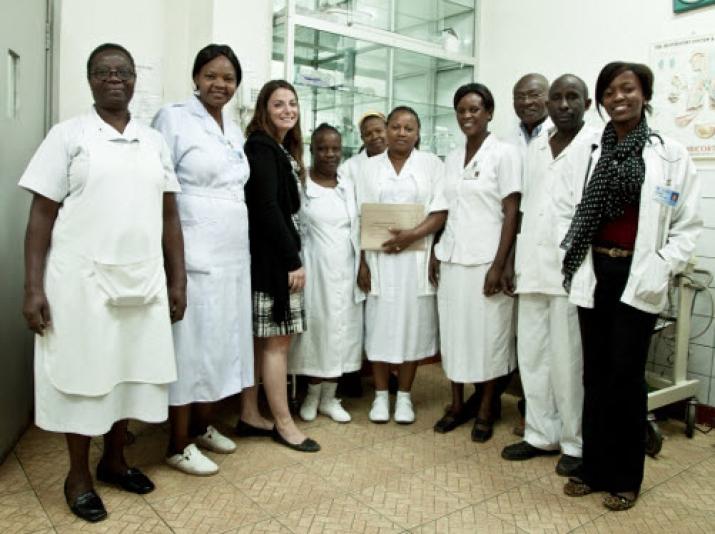
Sister Anna Mchaki (far left), Dr. Catherine Staton (third from left), Dr. Mark Mvungi (back right), from the KCMC Casualty Department research team with several members of the KCMC Casualty Department clinical team
Published September 25, 2015, last updated on February 25, 2016 under Research News
A recent study of traumatic brain injury (TBI) in Tanzania, led by emergency medicine and global health professor Catherine Staton, found a startlingly high mortality rate—47 percent—for severe TBI at the study site. The study described the quality of care for TBI patients at one of the largest hospitals in Tanzania—Kilimanjaro Christian Medical Center (KCMC) in Moshi—one of DGHI’s priority partnership locations.
“TBI, the leading cause of death from injury, has reached epidemic proportions in low and middle income countries, where cars and motorcycle use have far outpaced development in road, safety and healthcare infrastructure,” said Staton. “TBI largely affects young men, who are the primary financial providers, thus having an exponential impact on not only the patient, but also the local family, community, and society.”
Registry Established to Improve Care in the ER
According to Staton, rapid diagnostics and stabilization could mean the difference between life and death for TBI patients. To understand how to improve healthcare delivery in the KCMC Emergency Department, she and her colleagues established a TBI registry. The registry serves as the foundation for creating educational initiatives and resource-appropriate clinical practice guidelines, as well as identifying equipment and supply needs to improve healthcare administration.
Staton’s TBI registry was established so trained research nurses could prospectively record information, and to date, more than 2200 patients have been enrolled. This manuscript described nearly 900 patients over the course of a year arriving to KCMC within 24 hours of injury for acute TBI care. The registry contains information on how often vital signs were taken, what medical interventions were used and patient outcomes. This was the first prospective continuous TBI registry in sub-Saharan Africa designed to improve quality of care.
Lack of Vital Sign Monitoring a Serious Problem
Researchers advised that the quality of care on site could be improved with regular vital sign monitoring and the use of a clinical practice guidelines designed for the KCMC setting. The registry showed that less than 70 percent of the patients had a complete set of vital signs taken. Discussions with treatment providers revealed that limitations in availability of vial sign equipment such as thermometers and pulse oximeters as well as limited staff contributed to this result in the registry.
Increased Understanding of Issues May Lead to Better TBI Patient Care
With a more detailed picture of the epidemiology of TBI in sub-Saharan Africa and how patient care is acutely administered, researchers and clinicians may have the opportunity to improve the TBI patient care outlook.
The study was funded by the Mentored Research Training Program in collaboration with the KCMC Medical Education Partnership Initiative, the National Institutes of Health and the Duke Division of Emergency Medicine.
In addition to Staton, the team also included researchers from KCMC, Faculdada Inga in Brazil, and the London School of Hygiene and Tropical Medicine in the United Kingdom.


